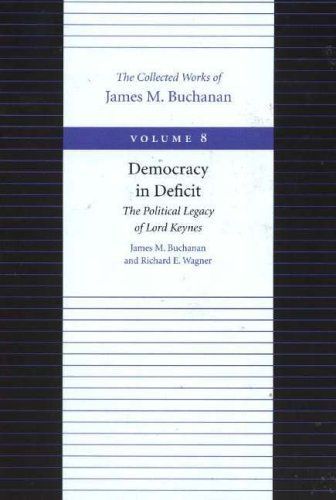
Democracy in Deficit The Political Legacy of Lord Keynes
Democracy in Deficit is one of the early comprehensive attempts to apply the basic principles of public-choice analysis to macroeconomic theory and policy. According to Robert D. Tollison in the foreword, "The central purpose of the book was to examine the simple precepts of Keynesian economics through the lens of public-choice theory. The basic discovery was that Keynesian economics had a bias toward deficits in terms of political self-interest.” Democracy in Deficit opened the door for much of the current work on political business cycles and the incorporation of public-choice considerations into macroeconomic theory. Even in the area of monetarism, Buchanan’s landmark work has greatly influenced the sway of contemporary theorists away from the nearly universally held belief of Keynesian theory. Democracy in Deficit contributes greatly to Buchanan’s lifelong fiscal and monetary rules to guide long-term policy in macroeconomics. The book serves to bolster Buchanan’s central beliefs in the necessity of a balanced-budget amendment to the U.S. Constitution and in monetary rules rather than central bank discretion. The book is co-authored with Richard Wagner, a respected colleague of Buchanan, whom Buchanan recognized as helping to keep the book free of polemics and on target with its central purpose of applying the elementary theory of public choice. James M. Buchanan is an eminent economist who won the Alfred Nobel Memorial Prize in Economic Sciences in 1986 and is considered one of the greatest scholars of liberty in the twentieth century. The entire series will include: Volume 1: The Logical Foundations of Constitutional Liberty Volume 2: Public Principles of Public Debt Volume 3: The Calculus of Consent Volume 4: Public Finance in Democratic Process Volume 5: The Demand and Supply of Public Goods Volume 6: Cost and Choice Volume 7: The Limits of Liberty Volume 8: Democracy in Deficit Volume 9: The Power to Tax Volume 10: The Reason of Rules Volume 11: Politics by Principle, Not Interest Volume 12: Economic Inquiry and Its Logic Volume 13: Politics as Public Choice Volume 14: Debt and Taxes Volume 15: Externalities and Public Expenditure Theory Volume 16: Choice, Contract, and Constitutions Volume 17: Moral Science and Moral Order Volume 18: Federalism, Liberty, and the Law Volume 19: Ideas, Persons, and Events Volume 20: Indexes